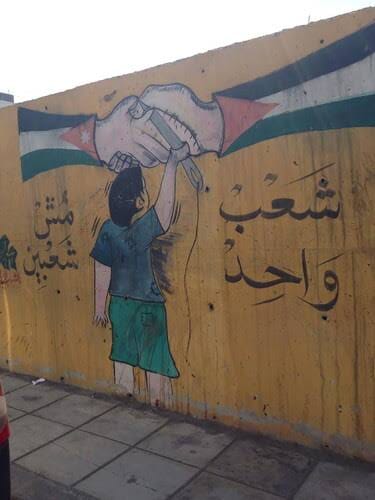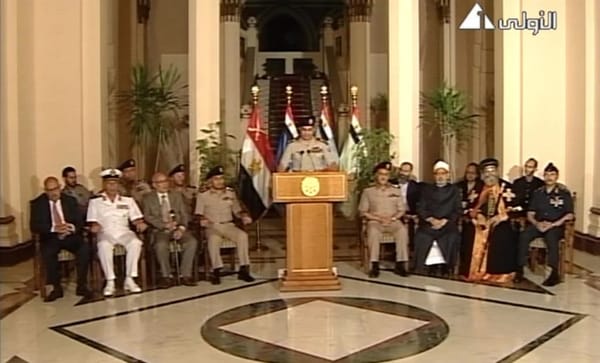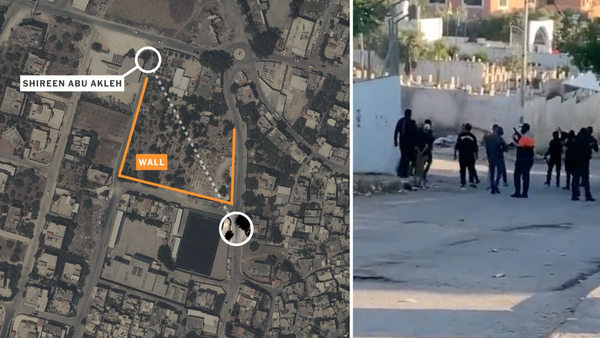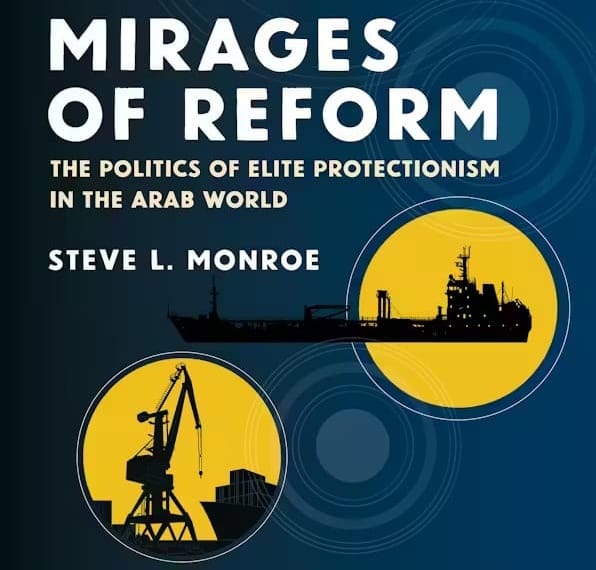Public scholarship in a weaponized public sphere
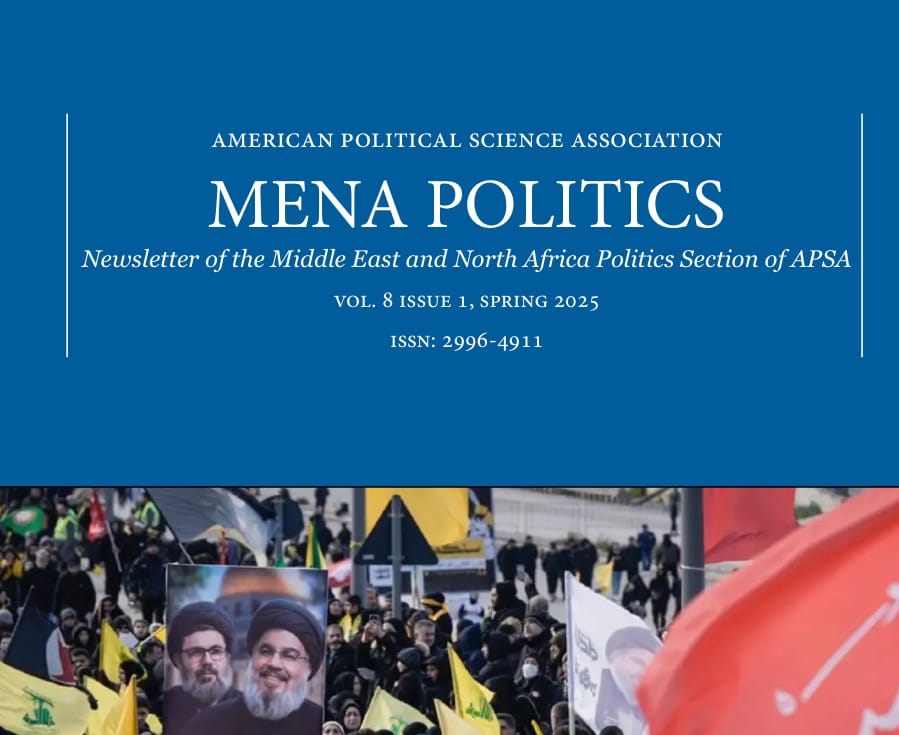
Plus regional order, racialization, Gulf politics, and all the new research in the MENA Academy!
I've been writing a lot about regional politics this week because of Trump's visit to the Gulf. But the MENA Academy never rests. Seriously, I don't think it ever rests... so many new publications (and requests to review manuscripts) land on my desk every week, despite all the pressure on universities and academics. No podcast this week, I'm afraid, but there's a lot to catch up on in this week's weekly roundup of new scholarship from the MENA Academy! So buckle up for an important intervention on our overheated online public sphere, a new issue of MENA Politics, a cluster of articles on racialization and exclusion, and some great new research on the Gulf, Egypt, and Western Sahara.
First up is an important overview of the weaponization of online content against academics in an overheated public sphere. Marc Owen Jones reflects on over a decade of research on the wild world of online disinformation and narrative conflict. Many Middle East specialists will be familiar with some of his examples and the issues he raises, but the general public and non-specialist academics probably are not. He especially highlights the risks for academics engaging in public scholarship in an online public sphere increasingly shaped by weaponized bad-faith actors. This is the kind of must-read piece which should be widely circulated among adminstrators and colleagues who might not understand what's going on when their social media mentions suddenly flood with posts accusing one of their faculty of antisemitism or academic misconduct. Read it here:
Marc Owen Jones, "Lessons from the Digital Coalface in the Post-Truth Age: Researching the Middle East Amid Authenticity Vacuums, Transnational Repression & Disinformation," Daedalus (May 2025). ABSTRACT: "Drawing on thirteen years of personal experience researching Middle Eastern politics, I examine how digitality has eroded traditional boundaries between safety and danger, public and private, and democratic and authoritarian spaces. While digital tools initially promised to make research more accessible and secure, they have instead created new vulnerabilities through sophisticated spyware, state-sponsored harassment, and transnational repression. These challenges are compounded by the neoliberal university, which pushes researchers toward public engagement while offering little protection from its consequences. Moreover, the integrity of digital data itself has become increasingly questionable, as state actors and private companies deploy bots, fake personas, and coordinated disinformation campaigns that create “authenticity vacuums ” in online spaces. This essay argues that these developments necessitate a fundamental reconsideration of digital research methodologies and ethics, offering practical recommendations for institutions and researchers to navigate this complex landscape while maintaining research integrity and protecting both researchers and their subjects."
Next up is the new issue of MENA Politics, the newsletter of the APSA's MENA Politics section, with a special focus on regional order. This is the first issue published under the new editorial team of Diana Greenwald, Lama Mourad, and Samer Shehata (I edited it for the first few years, followed by the stellar outgoing team of Nermin Allam, Gamze Cavdar, and Sean Yom). The issue leads with a fantastic feature essay by Louise Fawcett: "'New' Regional Order in the Middle East: plus ça change?" I found her essay especially interesting since Fawcett engages with my recent Cambridge Element What is the Middle East? and with the substance of my forthcoming co-edited volume Order and Region Making in the Middle East. Fawcett examines the meaning of "order" in the context of Middle Eastern regional international relations and pushes back on ideas that we are experiencing fundamental change. Everyone should read it, and then wait to see how we took on similar issues – more soon!
The MENA Politics issue then features several interconnected symposia. First, a diverse group of scholars offers short interventions on Fawcett's theme of "new regional order": Shahram Akbarzadeh, Pinar Bilgin, May Darwich, Adham Saouli, Ewan Stein, and Karim Makdisi. A second symposium takes up the related issue of Joe Biden's Middle Eastern legacy: Hamid Albloshi, Waleed Hazbun, Curtis Ryan, and Samer Shehata. Taken together, these two symposia bring together a wide range of interesting thinkers on Middle Eastern international relations, and should provide a lot of food for thought for anyone interested in the topic. Finally, a third symposia, organized by Rola el-Hosseini and Diana Greenwald, focuses on "the politics of time", featuring provocative essays by Adam Almqvist, Tamirace Fakhoury, Selin Bengi Gümrükçü, Ameni Mehrez, David Siddhartha Patel, and Sarah Anne Remnick.
Congratulations to the new editorial team for producing a fantastic new issue – download it free here. My own take on many of these issues coming soon, but will have to wait until our book publishes next month!
Next up: several new publications take on questions of identity, nationhood, and racialization across different Middle East (or Middle East-adjacent) contexts. Margot Dazey, Malik Hamila and Yong Li introduce a special issue of the Sciences Po journal Critique Internationale on racialization and social hierarchy which takes up key themes and extends the engagement between the French and American academy from our POMEPS-Pasiri publication "Race Politics and Colonial Legacies". In other articles, Manal Nadeem and Neha Vora explore exclusion and hierarchies in the UAE, Mesut Yegen examines exclusions and nationalism in Turkey, and Javier Bordon gives a critical reading of the securitization and Otherization of the Muslim Brotherhood in Saudi Arabia and the broader region.
Margot Dazey, Malik Hamila and Yong Li, "Racialization at the top of the social hierarchy," Critique Internationale (May 2025). ABSTRACT: Examining the dynamics of racialization that affect members of the upper classes involves confronting a paradox. Studies of colonial racism and the transatlantic slave trade have emphasized the close links between racialization and social subalternity, and between symbolic degradation and material inferiorization. “In the colonies […] you are rich because you are white, you are white because you are rich,” Frantz Fanon wrote. From this perspective, race appears to be a system of power that naturalizes the material domination of one social group over another. Racialized somatic and cultural characteristics function not only as marks of moral inferiority, but also as indicators of socioeconomic inferiority. But what happens to racial assignments in the case of individuals who are members of the upper classes? And how are the boundaries constructed between groups who are at the top of the social hierarchy but construed as racially different? These questions, which are fundamental to American sociology, are now being explored by a new generation of researchers in the French academic field. Reflecting this renewed interest, in this issue we examine how the social relations of race and class intertwine to shape the trajectories and behaviors of various “elites,” in different national contexts (Chile, France, and Senegal) and regional contexts (Asia, Northern Europe, South America, the Middle East, sub-Saharan Africa, and the Maghreb). Our intention in doing this is to extend a research tradition that is well-established on the other side of the Atlantic, while taking in the lie of the land in other nations, with a view to shedding light on the ways in which racial, religious, and cultural cleavages are created within privileged social strata.
Mesut Yegen, "Authoritarianism, Geopolitics and Nationhood: New Forms of Inclusion and Exclusion in Turkey," Studies in Ethnicity and Nationalism (May 2025). ABSTRACT: This paper explores politics of citizenship and nationhood in Turkey since the outbreak of Syrian War. It argues that the Turkish state's embracement of authoritarianism in domestic politics and a geopolitical perspective in regional affairs have paved the way for significant changes in admission to Turkish territory, Turkish citizenship and Turkish nationhood. Turkish nationhood, the paper suggests, has recently become inclusive towards non-citizen Muslims of non-European lands, such as Syrian refugees, and exclusive towards Turkish-citizen Kurds and Turkish-citizen members of the Gülen community. These changes, the paper concludes, confirm that the national community in Turkey is stratified in that it is composed of Turks, prospective-Turks and pseudo-Turks and that one's position in Turkishness hierarchy is not fixed.
Manal Nadeem and Neha Vora, "New Cartographies of Belonging and Exclusion in the United Arab Emirates," Social Change (May 2025). ABSTRACT: This article explores how recent policies of inclusion and exclusion in the United Arab Emirates (UAE) might be impacting South Asian diasporic communities and decision-making around immigration. We focus on the ‘Golden Visa’, which allows middle-class and elite immigrants in the UAE access to semi-permanence and a way around the entrenched kafala system of temporary migrant sponsorship. We consider how the Gulf migration regime is influenced by policymaking in South Asia just as much if not more than labour structures in the Gulf region. Gulf migration, we argue, contrary to normative narratives, might constitute an increase in rights for certain people, particularly given their experiences of diminished rights vis-à-vis their home countries. We consider how rights–rightlessness increasingly does not map neatly onto a citizen–non-citizen dichotomy and conclude that both immigrant and citizen rights are being renegotiated within new cartographies of belonging and exclusion in the UAE.
Javier Bordón, "‘They Are All the Same’: Securitising the Muslim Brotherhood in Saudi Arabia and Egypt, Ordering Space and the Regional ‘Common Sense’," The International Spectator (May 2025). ABSTRACT: Order in the Middle East cannot be fully understood without delving into the securitisation of the Muslim Brotherhood (MB). In its multi-faceted existence as an organisation, a movement and, most importantly, an idea, the MB weaves together transnational and domestic struggles over what political projects are legitimate, who holds dominant positions and other divisions and gradations that organise social space. By looking at securitisation as a struggle over order, it is possible to examine the post-2011 securitisation of the MB and its spatial implications, focusing on processes in the Kingdom of Saudi Arabia (KSA) and Egypt at the intersection of transnational politics. Combining securitisation theory, Bourdieu’s social theory and spatial theory strengthens our understanding of how interlocking securitisation processes carry far-reaching implications for power, order and space in the Middle East, shaping relations and the normative ‘common sense’ in and across scales.
Finally, a few interesting articles which don't neatly fit a theme: Lisa Blaydes with original data on Gulf perceptions of Chinese influence; Eduard Soler i Lecha and Ines Arco Escriche on the evolution of the Western Sahara conflict in an emerging multipolar order; and a brilliant dissection of Egypt under Sisi by Yezid Sayigh.
Lisa Blaydes, "“Selling” China in the Arab Gulf States: Economic Insecurity and Attitudes Toward Chinese Growth," Studies in Comparative International Development (May 2025). ABSTRACT: Arab Gulf countries have emerged as important targets of Chinese economic investment. This paper investigates attitudes toward China’s growing economy among nationals of Arab Gulf societies using original data from over 13,000 citizens in Bahrain, Kuwait, Oman, Qatar, Saudi Arabia, and the United Arab Emirates. I find that one in five believe that China’s growing economy is a good thing for their respective countries and that positive attitudes toward China’s economic rise are more common for older respondents, men, and those with higher levels of education—factors associated with more stable economic opportunities in Arab Gulf societies. Attitudes are also more positive within-subject over time after a respondent begins a new job. Finally, I find that attitudes toward China became more negative after the start of the COVID-19 pandemic, but only for economic “outsiders.” Taken together, these results suggest that Chinese economic growth and associated investments are viewed skeptically by less economically advantaged individuals who likely expect that China’s economic influence will be mediated through elite-driven projects with unclear benefits for their lives and livelihoods.
Eduard Soler i Lecha and Ines Arco Escriche, "The Western Sahara conflict in a post-hegemonic world: interests, values and foreign policy strategies," Journal of North African Studies (May 2025). ABSTRACT: This article explores how the trend toward competitive multipolarity both at the global and regional level is reshaping conflict dynamics in Western Sahara and intra-Maghreb relations. It examines the policies of two non-Western global powers (China and Russia) and two rising regional powers (Turkey and the United Arab Emirates), whose engagement in African affairs has grown significantly over the past two decades. The analysis investigates whether their positions on the Western Sahara conflict and the Maghreb are driven primarily by material interests – such as phosphates, fisheries, and energy resources – or by ideational factors, including normative concerns, reputation, status, and ideological affinities. Moreover, it underscores that Maghrebi actors have not been passive bystanders but have actively sought to engage these emerging powerhouses. Concretely, Morocco has stood out for its strategy of leveraging economic incentives to consolidate friendly positions or, at the very least, deter openly hostile stances against its interests. The article concludes that while material interests are not the primary drivers of these four countries’ policies toward the conflict, their engagement creates economic opportunities, particularly in the exploitation of natural resources.
Yezid Sayigh, "The Second Republic: Remaking Egypt Under Abdel Fattah El-Sisi," Carnegie Middle East Center (May 2025). ABSTRACT: President Abdel-Fattah el-Sisi seeks to modernize Egypt. The “new republic” he is building is marked by a radical redefinition of the social contract established after 1952, a new form of state capitalism, and a reinforcement of presidential powers within an emerging military guardianship. The regime is strong and cohesive at the top, however, its inability to achieve social and political hegemony and its overreliance on coercion leave the Second Republic at permanent risk of unravelling.
